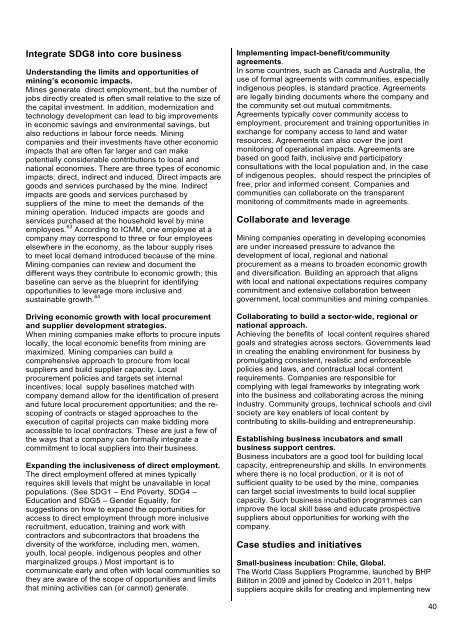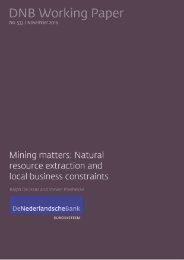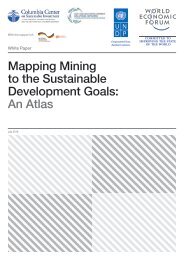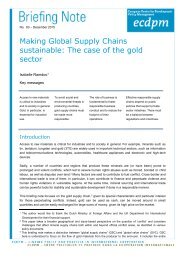Mapping Mining to the Sustainable Development Goals An Atlas
2gpArJN
2gpArJN
Create successful ePaper yourself
Turn your PDF publications into a flip-book with our unique Google optimized e-Paper software.
Integrate SDG8 in<strong>to</strong> core business<br />
Understanding <strong>the</strong> limits and opportunities of<br />
mining’s economic impacts.<br />
Mines generate direct employment, but <strong>the</strong> number of<br />
jobs directly created is often small relative <strong>to</strong> <strong>the</strong> size of<br />
<strong>the</strong> capital investment. In addition, modernization and<br />
technology development can lead <strong>to</strong> big improvements<br />
in economic savings and environmental savings, but<br />
also reductions in labour force needs. <strong>Mining</strong><br />
companies and <strong>the</strong>ir investments have o<strong>the</strong>r economic<br />
impacts that are often far larger and can make<br />
potentially considerable contributions <strong>to</strong> local and<br />
national economies. There are three types of economic<br />
impacts: direct, indirect and induced. Direct impacts are<br />
goods and services purchased by <strong>the</strong> mine. Indirect<br />
impacts are goods and services purchased by<br />
suppliers of <strong>the</strong> mine <strong>to</strong> meet <strong>the</strong> demands of <strong>the</strong><br />
mining operation. Induced impacts are goods and<br />
services purchased at <strong>the</strong> household level by mine<br />
employees. 63 According <strong>to</strong> ICMM, one employee at a<br />
company may correspond <strong>to</strong> three or four employees<br />
elsewhere in <strong>the</strong> economy, as <strong>the</strong> labour supply rises<br />
<strong>to</strong> meet local demand introduced because of <strong>the</strong> mine.<br />
<strong>Mining</strong> companies can review and document <strong>the</strong><br />
different ways <strong>the</strong>y contribute <strong>to</strong> economic growth; this<br />
baseline can serve as <strong>the</strong> blueprint for identifying<br />
opportunities <strong>to</strong> leverage more inclusive and<br />
sustainable growth. 64<br />
Driving economic growth with local procurement<br />
and supplier development strategies.<br />
When mining companies make efforts <strong>to</strong> procure inputs<br />
locally, <strong>the</strong> local economic benefits from mining are<br />
maximized. <strong>Mining</strong> companies can build a<br />
comprehensive approach <strong>to</strong> procure from local<br />
suppliers and build supplier capacity. Local<br />
procurement policies and targets set internal<br />
incentives; local supply baselines matched with<br />
company demand allow for <strong>the</strong> identification of present<br />
and future local procurement opportunities; and <strong>the</strong> rescoping<br />
of contracts or staged approaches <strong>to</strong> <strong>the</strong><br />
execution of capital projects can make bidding more<br />
accessible <strong>to</strong> local contrac<strong>to</strong>rs. These are just a few of<br />
<strong>the</strong> ways that a company can formally integrate a<br />
commitment <strong>to</strong> local suppliers in<strong>to</strong> <strong>the</strong>ir business.<br />
Expanding <strong>the</strong> inclusiveness of direct employment.<br />
The direct employment offered at mines typically<br />
requires skill levels that might be unavailable in local<br />
populations. (See SDG1 – End Poverty, SDG4 –<br />
Education and SDG5 – Gender Equality, for<br />
suggestions on how <strong>to</strong> expand <strong>the</strong> opportunities for<br />
access <strong>to</strong> direct employment through more inclusive<br />
recruitment, education, training and work with<br />
contrac<strong>to</strong>rs and subcontrac<strong>to</strong>rs that broadens <strong>the</strong><br />
diversity of <strong>the</strong> workforce, including men, women,<br />
youth, local people, indigenous peoples and o<strong>the</strong>r<br />
marginalized groups.) Most important is <strong>to</strong><br />
communicate early and often with local communities so<br />
<strong>the</strong>y are aware of <strong>the</strong> scope of opportunities and limits<br />
that mining activities can (or cannot) generate.<br />
Implementing impact-benefit/community<br />
agreements.<br />
In some countries, such as Canada and Australia, <strong>the</strong><br />
use of formal agreements with communities, especially<br />
indigenous peoples, is standard practice. Agreements<br />
are legally binding documents where <strong>the</strong> company and<br />
<strong>the</strong> community set out mutual commitments.<br />
Agreements typically cover community access <strong>to</strong><br />
employment, procurement and training opportunities in<br />
exchange for company access <strong>to</strong> land and water<br />
resources. Agreements can also cover <strong>the</strong> joint<br />
moni<strong>to</strong>ring of operational impacts. Agreements are<br />
based on good faith, inclusive and participa<strong>to</strong>ry<br />
consultations with <strong>the</strong> local population and, in <strong>the</strong> case<br />
of indigenous peoples, should respect <strong>the</strong> principles of<br />
free, prior and informed consent. Companies and<br />
communities can collaborate on <strong>the</strong> transparent<br />
moni<strong>to</strong>ring of commitments made in agreements.<br />
Collaborate and leverage<br />
<strong>Mining</strong> companies operating in developing economies<br />
are under increased pressure <strong>to</strong> advance <strong>the</strong><br />
development of local, regional and national<br />
procurement as a means <strong>to</strong> broaden economic growth<br />
and diversification. Building an approach that aligns<br />
with local and national expectations requires company<br />
commitment and extensive collaboration between<br />
government, local communities and mining companies.<br />
Collaborating <strong>to</strong> build a sec<strong>to</strong>r-wide, regional or<br />
national approach.<br />
Achieving <strong>the</strong> benefits of local content requires shared<br />
goals and strategies across sec<strong>to</strong>rs. Governments lead<br />
in creating <strong>the</strong> enabling environment for business by<br />
promulgating consistent, realistic and enforceable<br />
policies and laws, and contractual local content<br />
requirements. Companies are responsible for<br />
complying with legal frameworks by integrating work<br />
in<strong>to</strong> <strong>the</strong> business and collaborating across <strong>the</strong> mining<br />
industry. Community groups, technical schools and civil<br />
society are key enablers of local content by<br />
contributing <strong>to</strong> skills-building and entrepreneurship.<br />
Establishing business incuba<strong>to</strong>rs and small<br />
business support centres.<br />
Business incuba<strong>to</strong>rs are a good <strong>to</strong>ol for building local<br />
capacity, entrepreneurship and skills. In environments<br />
where <strong>the</strong>re is no local production, or it is not of<br />
sufficient quality <strong>to</strong> be used by <strong>the</strong> mine, companies<br />
can target social investments <strong>to</strong> build local supplier<br />
capacity. Such business incubation programmes can<br />
improve <strong>the</strong> local skill base and educate prospective<br />
suppliers about opportunities for working with <strong>the</strong><br />
company.<br />
Case studies and initiatives<br />
Small-business incubation: Chile, Global.<br />
The World Class Suppliers Programme, launched by BHP<br />
Billi<strong>to</strong>n in 2009 and joined by Codelco in 2011, helps<br />
suppliers acquire skills for creating and implementing new<br />
40






